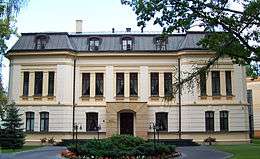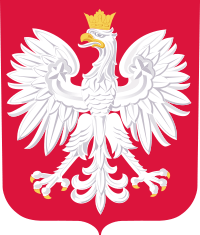Constitutional Tribunal (Poland)
The Constitutional Tribunal (Polish: Trybunał Konstytucyjny) is the constitutional court of the Republic of Poland, a judicial body established to resolve disputes on the constitutionality of the activities of state institutions; its main task is to supervise the compliance of statutory law with the Constitution of the Republic of Poland. It was established on 26 March 1982 by the communist government of the People's Republic of Poland after the introduction of martial law, an attempt to crush political opposition.
| Constitutional Tribunal | |
|---|---|
| Trybunał Konstytucyjny | |
 | |
| Established | 1982-constitutional amendment establishing the Constitutional Tribunal 1986-the beginning of activity |
| Location | Warsaw |
| Composition method | Prime ministerial nomination with Sejm RP confirmation President and Vice President appointed by President of the Republic |
| Authorized by | Constitution of the Republic of Poland |
| Judge term length | 9 years, only one term |
| Number of positions | 15 |
| Website | www |
| President | |
| Currently | Julia Przyłębska (disputed) |
| Since | 21 December 2016 |
| Vice President | |
| Currently | dr hab. Mariusz Muszyński |
| Since | 5 July 2017 |

 |
|---|
| This article is part of a series on the politics and government of Poland |
|
|
Related topics
|
|
|
The Constitutional Tribunal adjudicates on the compliance with the Constitution of legislation and international agreements (also their ratification), on disputes over the powers of central constitutional bodies, and on compliance with the Constitution of the aims and activities of political parties. It also rules on constitutional complaints.
The Constitutional Tribunal is made up of 15 judges chosen by the Sejm RP (the lower house of parliament) for single nine-year terms. The Constitutional Tribunal constitutes one of the formal guarantees of a state grounded on the rule of law.
Three judges, appointed by the President of the Tribunal, serve as members of the National Electoral Commission (Act of 5 January 2011 Electoral Code).
In 2016 Julia Przyłębska, an ally of Law and Justice, was appointed as President of the Constitutional Tribunal. Her appointment has been argued to be unconstitutional because she was appointed directly by the President of the Republic rather than being elected by judges on the Tribunal, as required by Poland's Constitution.
Since the reform and takeover of the Constitutional Tribunal by politicians from the ruling party, the independence and sovereignty of this institution has been criticized and often called as a "puppet"[1] court by many Polish judges associations and foreign judicial organizations and also by the counterparts of the Constitutional Tribunal in other countries.[1][2][3][4]
History
The Constitutional Tribunal was established by the amendment of the Constitution of the People's Republic of Poland of 26 March 1982 Due to the brevity of the introduced article 33a it was decided that a law must be brought forth that would outline the proceedings of the Constitutional Tribunal.[6] This became an intricate process with 15 drafts developed, and the final act was ratified by the Sejm on 29 April 1985 which allowed for the formal commencement of the Tribunal's judicial proceedings on 1 January 1986.[6] But the courts competence and judicial capacity were limited at this time, as all rulings on the constitutionality of bills could be dismissed by a 2/3 majority vote in the Sejm.[7] This in effect would place the rulings in an indefinite moratorium as these votes rarely occurred.[7]
On 24 January 1986 the first motion, reference U 1/86, was brought before the Constitutional Tribunal on behalf of the Presidium of the Provincial National Council in Wrocław.[6] The claimants sought to contend two paragraphs of the Ordinance of the Council of Ministers in regards to the sale of state property and the procedures and costs related to it as unconstitutional.[6] In opposition with the governments stance, the court ruled in a 3-member panel on 28 May 1986 that the introduced paragraphs were unconstitutional.[6] The Council of Ministers called for a revaluation of the case, but on 5 November 1986 the Constitutional Tribunal upheld its ruling.[6]
In 1989 the Constitutional Tribunal's powers expanded as it secured the right to universally decide on the binding interpretation of laws.[7] Many changes came with the enactment of the 1997 Constitution; the number of judges increased from 12 to 15, terms of office were elongated by 1 year for a total of 9 years, and the Tribunal lost its competence to decide the interpretation of legal statutes (in the form of abstract provisions).[7]
In June 2015, the Sejm of the VII tenure enacted a new provision on the Constitutional Tribunal in which it sought to transfer the power of election of all Constitutional Tribunal judges whose term ended in 2015 to the Sejm.[8] Subsequently, 5 judges were elected by the Sejm on 8 October 2015 and an additional 5 on 2 December 2015 by the Sejm of the VIII tenure which resulted in what was known as the 2015 Polish Constitutional Court crisis.[8] Between November 2015 and December 2016, 6 so-called remedial bills which were devised by the Law and Justice party were enacted and in December 2016 the President of the Constitutional Tribunal replaced 3 judges appointed by the VII tenure with 3 judges from the VIII tenure.[8]
Current Justices
| No. | Term of office | Full name | Comment |
|---|---|---|---|
| 1. | since 23 July 2012[9] | prof. Leon Kieres | |
| 2. | since 2 December 2015[10] | dr hab. Mariusz Muszyński | Vice-President of The Tribunal since 5 July 2017 Disputed[11] |
| 3. | since 3 December 2015 | Piotr Pszczółkowski[12] | Disputed[13] |
| 4. | since 9 December 2015 | Julia Przyłębska[14] | President of the Tribunal since 21 December 2016 (acting President of the Tribunal 20–21 December 2016) Disputed[15] |
| 5. | since 28 April 2016[16] | dr hab. Zbigniew Jędrzejewski | |
| 6. | since 20 December 2016 | dr hab. Michał Warciński[17] | |
| 7. | since 28 June 2017[18] | dr Andrzej Zielonacki[19] | |
| 8. | since 18 September 2017[20] | dr hab. Justyn Piskorski[21] | Disputed[22] |
| 9. | since 30 January 2018[23] | dr hab. Jarosław Wyrembak[24] | Disputed[25] |
| 10. | since 8 April 2019[26] | dr Wojciech Sych[27] | |
| 11. | since 5 December 2019[28] | dr hab. Krystyna Pawłowicz[29] | |
| 12. | since 5 December 2019[28] | Stanisław Piotrowicz[30] | |
| 13. | since 5 December 2019[28] | prof. Jakub Stelina[31] | |
| 14. | since 7 January 2020[32] | dr hab. Rafał Wojciechowski[33] | |
| 15. | since 9 April 2020[34] | Bartłomiej Sochański[35] | |
The three judges appointed on 2 December 2015 (Henryk Cioch, Lech Morawski, Mariusz Muszyński) are disputed. The Sejm appointed them (with two others) before the parliamentary elections of 2015; after these elections, the Sejm invalidated their appointment and elected five new judges in their place. The president denied the serment to the five appointed before the election and swore the five new judges in. Cioch and Morawski died while in office. Two new judges were appointed: Justyn Piskorski and Jarosław Wyrembak.
Of the appointments made before the election, the Constitutional Tribunal itself invalidated two (Bronisław Sitek and Andrzej Sokala) and accepted three (Roman Hauser, Krzysztof Ślebzak and Andrzej Jakubecki). As a consequence, of the appointments made after the election, the Tribunal accepted two (Piotr Pszczółkowski and Julia Przyłębska) and invalidated three (Henryk Cioch, Lech Morawski and Mariusz Muszyński). See Polish Constitutional Court crisis, 2015.
See also
- Judiciary
- Rule of law
- Rule According to Higher Law
- Supreme Court of Poland
- Polish Constitutional Court crisis, 2015
References
- "Prezes polskiego TK o słowach prezesa niemieckiego TK: jestem zażenowana". Onet.pl. 13 May 2020. Archived from the original on 13 May 2020. Retrieved 13 May 2020.
- prof. Marcin Matczak. "Poland's Constitutional Crisis: Facts and interpretations" (PDF). Archived (PDF) from the original on 13 May 2020. Retrieved 13 May 2020.
- Dominika Sitnicka (22 April 2020). "Captured Constitutional Tribunal rules on the Supreme Court: Implementation of CJEU judgment inconsistent with EU law". Rule of Law. Archived from the original on 13 May 2020. Retrieved 13 May 2020.
- Tomasz Tadeusz Koncewicz (13 March 2020). "From Constitutional to Political Justice: The Tragic Trajectories of the Polish Constitutional Court". Reconnect EU. Archived from the original on 13 May 2020. Retrieved 13 May 2020.
- Dz.U. z 1982 r. nr 11, poz. 83.
- Alberski, Robert (2010). Trybunał Konstytucyjny w polskich systemach politycznych. Wrocław: Wydawnictwo Uniwersytetu Wrocławskiego. ISBN 978-83-229-3146-2.
- Skrzydło, Wiesław; Grabowska, Sabina; Grabowski (red.), Radosław (2009). Konstytucja Rzeczypospolitej Polskiej. Komentarz encyklopedyczny. Warsaw: Wolters Kluwer Polska. ISBN 978-83-7601-686-3.
- Kryszkiewicz, Małgorzata; Osiecki, Grzegorz (2016). "Twarda linia Prawa i Sprawiedliwości". Dziennik Gazeta Prawna.
- M.P. z 2012 r. poz. 506; Przebieg procesu legislacyjnego – druk nr 507
- M.P. z 2015 r. poz. 1184
- The 8th Sejm found his election legitimate, even though prof. Andrzej Jakubecki had been elected previously.
- M.P. z 2015 r. poz. 1186; Przebieg procesu legislacyjnego – druk nr 56
- The 8th Sejm found his election legitimate, even though prof. Bronisław Sitek had been elected previously.
- M.P. z 2015 r. poz. 1185; Przebieg procesu legislacyjnego – druk nr 56
- The 8th Sejm found her election legitimate, even though prof. Andrzej Sokala had been elected previously.
- M.P. z 2016 r. poz. 393; Przebieg procesu legislacyjnego – druk nr 369
- M.P. z 2016 r. poz. 1206; Przebieg procesu legislacyjnego – druk nr 1046
- prezydent.pl. "Oficjalna strona Prezydenta Rzeczypospolitej Polskiej / Aktualności / Wydarzenia / Prezydent odebrał ślubowanie od sędziego Trybunału Konstytucyjnego". www.prezydent.pl. Retrieved 28 June 2017.
- M.P. z 2017 r. Nr , poz. 610
- Prezydent RP przyjął ślubowanie od nowego sędziego TK Oficjalna strona Prezydenta Rzeczypospolitej Polskiej
- M.P. z 2017 r. Nr , poz. 873
- He was elected by the 8th Sejm after death of prof. Lech Morawski, who was elected instead of prof. Krzysztof Ślebzak, whose election had been declared invalid.
- "Nowy sędzia TK Jarosław Wyrembak złożył ślubowanie". interia.pl. 30 January 2018. Retrieved 30 January 2018.
- M.P. z 2018 r. Nr , poz. 134
- He was elected by the 8th Sejm after death of prof. Henryk Cioch, who was elected instead of prof. Roman Hauser, whose election had been declared invalid.
- "Oficjalna strona Prezydenta Rzeczypospolitej Polskiej / Aktualności / Nominacje / Prezydent przyjął ślubowanie od nowego sędziego TK". www.prezydent.pl. Retrieved 9 May 2019.
- M.P. z 2019 r. Nr , poz. 414
- "Ślubowanie nowych sędziów TK". prezydent.pl. 5 December 2019. Retrieved 6 December 2019.
- M.P. z 2019 r. Nr 0, poz. 1132
- M.P. z 2019 r. Nr 0, poz. 1133
- M.P. z 2019 r. Nr 0, poz. 1134
- "Oficjalna strona Prezydenta Rzeczypospolitej Polskiej / Aktualności / Nominacje / Ślubowanie sędziego Trybunału Konstytucyjnego". www.prezydent.pl. Retrieved 7 January 2020.
- M.P. z 2019 r. Nr 0, poz. 1197
- "Oficjalna strona Prezydenta Rzeczypospolitej Polskiej / Aktualności / Nominacje / Ślubowanie sędziego Trybunału Konstytucyjnego". www.prezydent.pl. Retrieved 9 April 2020.
- M.P. z 2020 r. Nr 0, poz. 340
- Shotter, James; Huber, Evon (13 July 2017). "Poland's ruling party drafts bill to force judges to step down". Financial Times.
External links

- Official website
